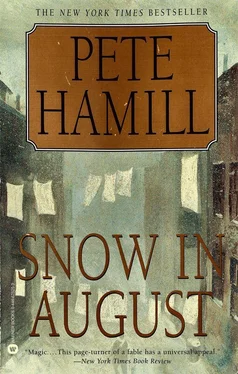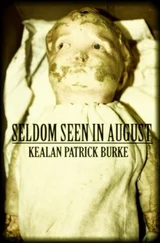The rabbi smiled. “The tea!”
He went to the stove and lifted the boiling water and poured it into a pot.
“We soon have the tea!”
“What are those other books?” Michael said. “You started to say—”
“Yiddish,” the rabbi said. “The language of the people. The ordinary people. Not the rabbis. The ordinary people.”
“What are the books about?”
The rabbi stood before the bookcase.
“They are about the everything,” he said, lifting a volume. “Religion. The history of the Jews.” He hefted a volume. “But also Balzac. You know Balzac?”
“No.”
“Very good, Balzac. A very smart Franceman. You should read the Balzac. He knows everything. And this, this is Henrich Heine. Very good poetry. And here, Tolstoy, very great.”
Michael squatted down, took a dusty book off a bottom shelf, and opened it.
“Is this Hebrew or Yiddish?”
The rabbi perched the glasses on his nose.
“Yiddish.”
“What’s it say?”
“Is a very funny story. Very sad too. Good Soldier Schweik. A Czech soldier, he knows the war is crazy. I am sure all are in the English books too.”
The rabbi turned away and found two glasses on a shelf above the sink. He poured the tea. Then he folded the newspapers and moved them aside and set the glasses on the table and gestured for the boy to sit down. Michael had never had tea in a glass before. The rabbi then placed a sugar bowl and a spoon between them. Suddenly he reached forward awkwardly, offering his hand. Michael shook it.
“I am Rabbi Hirsch,” he said. “Judah Hirsch.”
“Michael Devlin,” the boy said.
“You are kind boy,” the rabbi said, rhyming kind with kin . Michael repeated the word, rhyming it with rind . Then the boy lifted the tea and sipped. The glass was hot in his hand.
“This is great,” he said, putting the glass down to let it cool.
“Is hard to get the good tea in America,” the rabbi said. “Maybe the water?”
So he was from Europe, where the water was different. Michael remembered the blue books and said: “Are you from Poland?”
“No. From Prague. You know where is Prague?”
“I know about the Infant of Prague. It’s a statue of Jesus that’s supposed to work miracles or something. They sell little copies of it up at Sacred Heart. But I’m not sure exactly where Prague is.”
“In Czechoslovakia,” he said. “Beautiful city, Prague. Shain. Zaier shain …. Most beautiful city in all of the Europe.”
Sadness surged in his voice then, and he seemed guarded, and Michael thought of his mother when she would sing certain songs about the Ireland she’d left behind. The Old Country, she would always say. While living in the new country.
“Why you think I am Polish?”
“I read in a book that before the war there were three million Jews in Poland.”
“True. Now? None left. All dead.”
Abruptly, he shifted his eyes to the newspaper.
“English, very strange language.”
“Are you going to school to learn it?”
“No. No. Teaching myself. But is very hard.” He held up the back page of the Daily News and pointed at the headline. “Look, what is this mean?”
The headline said: FLOCK SIGNS ROBBIE.
“Well,” Michael said. “It’s about baseball.”
For the first time, and not the last, Michael began to explain the mysteries of baseball to the rabbi from Prague. He started with the word flock , which meant the Brooklyn Dodgers. The reason they were called the flock, he said, was that years ago they were called the Robins. And robins were birds. So even after they changed their name they remained a flock of birds.
“But nobody ever calls them the flock,” the boy said, “except in the newspapers. Here we just call them the Dodgers. Or dem Bums.”
The rabbi’s eyes looked quizzical.
“Dem Bums?” He paused. “What it means?”
“Well, a bum is like a tramp, a worthless person.”
“So they don’t like them?”
“No, we love them. But when they lose, here in Brooklyn, we call them dem Bums. Dem is a Brooklyn word for them . We should say ‘those Bums,’ but — You see, Rabbi, it’s like a Brooklyn way of saying things. In the movies or on the radio, they talk different…”
Michael’s voice dribbled into frustrated silence; in some ways, baseball was really too hard to explain. He could never explain any of it to his mother. You probably had to be born to it. The rabbi stared at the boy, his brow furrowed, as if he were realizing again that learning English would not be simple. Then he pointed at the other word.
“What is Robbie? Is a Bum?”
“We don’t know yet.”
Michael explained that Robbie was a baseball player named Jackie Robinson. He was a colored man, a Negro, and there had never been a Negro player in the big leagues before. So the headline meant that the Dodgers had signed a contract with Jackie Robinson and if Robinson got through spring training he should be playing in Ebbets Field by the middle of April. This year. Nineteen forty-seven. The first Negro in the big leagues.
“What is the big leagues?” Rabbi Hirsch said.
“Well, there are two major leagues, which is another way of saying big leagues. The Dodgers are in the National League. So are the Giants, who are over in Manhattan in a place called the Polo Grounds. But the Yankees, who are up in the Bronx, they’re in the American League. Then there are a lot of minor leagues. The best players are in the major leagues, especially now that the war is over….”
He struggled to make all of this simple. But the rabbi’s face became a tight grid of concentration.
“I must to learn all this,” he said, shaking his head. “If I am to be in America, I must to learn.” He looked up at Michael. “Maybe you can teach me.”
“Aw, gee, Rabbi, I don’t know. I’m still learning it myself.”
“No, no, you speak good. You could teach me. I know this.”
Michael felt suddenly trapped; the rabbi was asking him to do something a lot more complicated than turning on a light switch.
“Money, I don’t have, to pay you with it,” the rabbi said. “But Yiddish I could teach you. You give me English, I give you Yiddish.”
Michael glanced at the bookcase. The rabbi looked poor. This room was as poor as any room on Ellison Avenue; by comparison, Sacred Heart was a palace. If the rabbi had a secret treasure, he certainly wasn’t using it for himself. But he did have this other treasure, right here in front of him: these mysterious books with their strange alphabets. For a moment, Michael felt people rising from the books, bearded men and dark-haired women, a soldier who hated war, a Frenchman who knew everything, all of them speaking languages he had never heard. They rose from the bookcase like a mist.
He wanted to speak to them and for them to speak to him. And perhaps that could be done. In this deep and endless Yukon winter, there was nothing much to do in the afternoons, no ball games to play, no aimless journeys around the parish with his friends. He had time on his hands. Too much time.
“You really think you can teach me Yiddish?” he said.
“Sure thing,” the rabbi said, pleased with his use of the American phrase.
“Well, we could try,” Michael said.
The rabbi smiled broadly.
“Good! Very good!” He drained his tea, then wiped his mouth with his sleeve. “Yiddish is very great language, but not hard. Not hard like the English is hard. You can learn.” He slapped Michael on the back. “How you say it? Is a deal!”
Michael finished his tea and looked around for a clock. There was no clock. There was no radio either. He glanced at the heavy door in the corner.
Читать дальше












